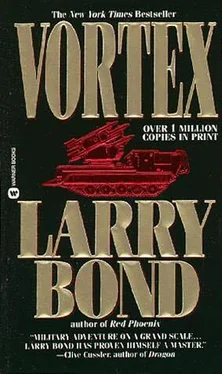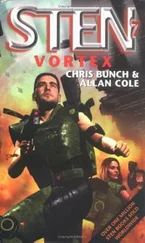Hanging over everything was the sickening, pungent tang of death, decay, and thousands of gallons of jet fuel poured out and left to evaporate or go up in flames.
Louis Trichardt Air Base had died an ugly and lingering death. But now its new owners were hard at work resurrecting the freshly captured corpse.
Four six-wheeled vehicles were parked at various points along the main runway, each mounting four “Romb” surface to-air missiles. NATO called them SA-8A Geckos. An acquisition radar mounted on each vehicle scanned the skies
above for any indication of an incoming air raid. The SAM battery had a conventional backup-eight towed 23mm antiaircraft cannon spaced at regular intervals along the rest of the airfield perimeter. Their long, twin gun barrels pointed toward the sky, ready to throw a fiery curtain of high-explosive rounds at any attacking plane.
Behind this protective screen of SAMs and automatic weapons, teams of
Cuban combat engineers supervised sweating gangs of black South African laborers filling in craters and clearing away wreckage by hand-volunteers” in the service of their own liberation. Other blacks were busy carting off the last few dead Afrikaners for disposal in a mass grave beside the main runway.
Gen. Antonio Vega watched the blacks working with a practiced eye, a slight, worried frown on his stern, narrow face. There were fewer genuine volunteers than he’d hoped for. His political officers and ANC liaisons blamed the dearth of willing labor on civilian casualties caused by artillery and air bombardments directed against SADF positions inside the black townships surrounding Louis Trichardt.
Well, perhaps that was so. The Cuban general shrugged. Did these South
African blacks expect to win freedom and a proper political structure without loss? If so, they would be bitterly disappointed. Wars and revolutions were always brutal and bloody affairs, he thought. And he should know. He’d fought through enough of both during more than thirty years of service to Fidel Castro and his people.
Some of the ANC officers assigned to him reported that a few of their people believed the Cubans to be nearly as racist as the Afrikaners they displaced. And why? Simply because the army of liberation needed their strong backs and unskilled hands. Vega scowled. Racism! What nonsense.
Why, he had black Cuban officers on his own staff. Brave and competent men-every one of them.
As for the charge that he used South African blacks only for manual labor, what of it? Hadn’t Karl Marx himself said it best?
“From each according to his abilities, to each according to his needs.”
He dismissed the problem from his mind. Let the rear-area commissars worry about such matters. He had a war to fight and win.
Vega turned to the stout, mustachioed colonel of engineers waiting silently beside him.
“Well, Luis? How soon before our planes can land here?”
“Twenty-four hours, Comrade General.” The colonel sounded certain-always a safe tone to use around Vega.
“My heavy equipment should arrive before sundown, and when it does…” He waved away the waist-high piles of debris still littering the runways as though they were nothing more than dust before a broom.
Vega patted him on the shoulder and glanced at the shorter, thinner Air
Force officer attached to his personal staff.
“You hear that, Rico.
Twenty-four hours. That’s good news, eh?”
“Yes, sir. ” The Air Force major pointed toward the sweating work crews.
“Once they’ve got the main runway cleared, we can start flying in ground elements of the brigade. And once they’re here, we’ll have this base back in full operation within half a day.”
Vega nodded his understanding. Cuban forward air-base operations were organized around special brigades made up of all the skilled troops needed to keep jet aircraft flying and combat ready-air traffic controllers, mechanics, armament and fueling specialists, planning staff, and pilots.
Even more important, Cuba’s fighters and transport aircraft, like all Soviet-made planes, were able to use captured NATO rearming, refueling, and maintenance equipment. And the South Africans used NATO standard gear.
How thoughtful of them, Vega mused.
He stared beyond the airfield toward the multi lane highway running south.
South toward the vital road junction and minerals complex at Pietersburg, one hundred and twenty kilometers away. And south toward the enemy capital of Pretoria, two hundred and eighty kilometers beyond Pietersburg. A hint of yellowish dust and gray-white smoke on the horizon marked the position of his First Brigade Tactical Grouptanks, armored cars, and APCs driving steadily forward despite slowly stiffening Afrikaner resistance.
Vega allowed himself a short moment of self-congratulation. Capturing this air base would breathe new life and vigor into this portion of his grand offensive. Urgently needed supplies and spare parts could be flown in with ease instead of being trucked south from Zimbabwe over hundreds of kilometers of dangerous road. Even better, MiG fighters and fighter bombers based here would be only a few short minutes’ flying time from the battlefront-drastically increasing their time on station and the number of missions they could fly as they hunted for Afrikaner targets on the ground and in the air.
It all added up to one thing: Pretoria was going to have to commit an ever-increasing number of its own troops to this front. Troops that would have to be stripped from other parts of South Africa.
Vega smiled grimly. Karl Vorster and his generals were about to learn another painful lesson in logistics, careful planning, applied air power, and deft footwork.
Abruptly the Cuban general turned on his heel and headed back to his command vehicle. Small victories were worth gloating over only if they brought total victory in sight. Time to look at the big picture.
FIRST BRIGADE TACTICAL GROUP, NEAR BANDELIERKOP, SOUTH AFRICA
More than twenty wheeled and tracked Cuban armored vehicles rumbled across the Transvaal countryside-smashing through barbed-wire fences meant to pen in cattle, flattening fields of tall grass, and grinding new-planted wheat and corn into the damp earth. No revealing plumes of dust rose today to mark their passage. A late-spring storm had come and gone earlier in the morning-tearing out of the east in a drumbeat barrage of wind-tossed rain and thunder.
Now a barrage of human making hammered the veld.
Whaamm! Dirt founmined high into the air two hundred meters ahead of the advancing Cuban column, and newly promoted Maj. Victor Mares ducked behind the steel hatch cover of his BTR-60. He clicked the transmit button on his radio mike.
“Any sign of that OP, Lieutenant?”
“Not yet, Comrade Major.” The voice of the advance guard’s scout commander crackled through his earphones.
Mares ducked and swore as another South African shell ploughed into the fields off to the left. Closer this time. Steel splinters whined overhead. The damned Afrikaners had to have somebody with a radio and a map guiding their fire. But where?
“We may have found it, Major!” Excitement made the scout lieutenant sound even younger than he was.
“We’re closing on a stone farmhouse about three kilometers ahead of your position. Will investigate.”
Mares let the mike fall free to dangle on a cord around his neck and raised his binoculars. Low hills. Dark, cloudy sky. Magnified views of vehicles only a few score meters ahead. The sky again. Curse it, the
BTR’s rocking and rolling motion made it almost impossible to focus on anything for more than a fraction of a second. He braced himself and tried to ride with the vehicle as though it were a bucking bronco like those he’d seen in American cowboy movies aired on the officially forbidden and periodically jammed TV Marti.
Читать дальше












